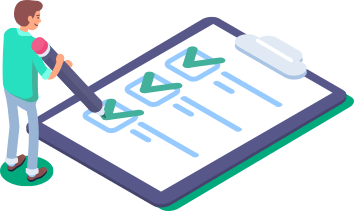How to Decline a Job Offer and Examples
It’s never easy, but sometimes declining a job offer is necessary. This article provides you with the best situation-specific ways to politely turn down a job offer
The Best Words to Describe Yourself in Any Situation
Whether it’s a resume, job interview or a college application, knowing how to describe yourself sets the tone for the rest of the conversation.
How to Write an Interview Thank You Email
The Thank-you Email after an interview can help you stand out from the rest of the candidates and it’s also a great opportunity to remind a hiring manager how awesome you are. Learn how to write a great Thank-you email.
The Best Way to List Professional Certifications on Resumes
If you're looking for assistance with your resume, JobHero can help. Visit the site to learn the best way to list professional certifications on resumes!
What is a media director
Media Directors guide the entire process of an advertising campaign. Find out more about their responsibilities, skills and salaries.
What is a maintenance assistant
Maintenance Assistants keep facilities clean and in good operating condition. To find out more about their specific duties and wages, click the link.
What is a logistics assistant
A Logistics Assistant supports the logistics manager in all aspects of warehouse operations. Get great insight on this profession right here.
 4 min
4 minWhat is a kyc analyst
A Know Your Customer Analyst primarily reviews documentation for new customer accounts, among other tasks. Find out more in our KYC resource page.
What is a district sales manager
A District Sales Manager oversees a company's sales force and develops sales plans and projections for a given region. Find out more here.
What is a development associate
Development Associates assist in overseeing fundraising activities and recording donations for nonprofit organizations. Learn more about theirs skills and salaries.
What is a development coordinator
Development Coordinators are responsible for organizing and executing fundraising efforts for a nonprofit organization. Find out how much they earn and what skills they need.
What is a recruiting coordinator
Recruiting Coordinators facilitate the flow of candidates through the recruitment process. To find out more about this job, check out our resource page.
What is a product engineer
A Product Engineer specializes in designing products and their corresponding manufacturing processes. Get a clear picture of what this profession entails.
What is an usher
Ushers are responsible for checking in patrons and showing them to their seats at large events. To know more about their tasks and wages, click here.
What is an event specialist
Event Specialists are marketing professionals who bring marketing to the public. Find out more about their responsibilities, skills and salaries.
What is a personal driver
Personal Drivers provide transportation for passengers from one location to another. Find out what it takes to become on how much they earn.
What is a performance analyst
Performance Analysts evaluate system performance and outcomes for companies. To get a glimpse of what the job is like, check out this page.
What is a network analyst
Network Analysts create hardware and software configurations in order to to improve the functionality of a network system. Find the skills, responsibilities and wages for this job.
What is a legal officer
Legal Officers are responsible for monitoring all legal affairs within their organization. To find out more about their specific duties and wages, click the link.
What is a leasing manager
Leasing Managers oversee the leasing of multiple apartments, condos or houses. Find out more in our resource page.
What is an infrastructure manager
An Infrastructure Manager specializes in computer network infrastructures. Learn more about theirs skills and salaries.
What is an infrastructure engineer
An Infrastructure Engineer designs, coordinates and maintains the infrastructure of an apartment complex, public facility or entire cities. Find out more here.
What is an event assistant
Even Assistant ease the Event Planner's workload. For a better idea of their tasks and wages, check out our resource page.
What is a content developer
A Content Developer is responsible for developing a company's content strategy, as well as creating its deliverables. Find out how much they earn and what skills they need.
What is a cloud architect
Cloud Architects monitor cloud activity, design and migrate applications. amongst many other tasks. For a more detailed look, click here.
What is a chief investment officer
Investment Officers are in charge of managing their organization's investment portfolios. Get great insight on this profession right here.
What is a business development coordinator
Business Development Coordinators are responsible for maintaining good relationships with current clients while building new client relationships. Find out more here.
Don’t miss out on your dream job
— use JobHero’s Resume Builder to create a resume that serves as the best representation of yourself: a true professional!
Get Started


